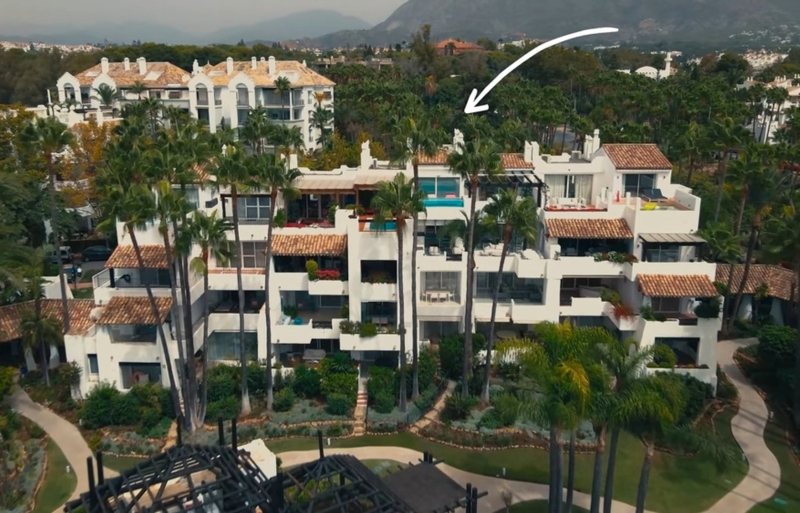A penthouse in Spain registered to MGIMO University rector Anatoly Torkunov’s daughter, Yekaterina Torkunova. Screenshot: Anti-Corruption Foundation (ACF)
The authors of Russia’s new history textbook for 11th grade students own luxury real estate in Moscow, the Moscow Region, and Spain worth more than 8 billion rubles (close to $100 million), a new investigation by the late Alexei Navalny’s Anti-Corruption Foundation (ACF) reveals. The real estate value held by the family of former Minister of Culture Vladimir Medinsky were estimated at 6 billion rubles ($74.5 million), with the remainder being owned by his co-author, MGIMO University rector Anatoly Torkunov.
Investigations into Medinsky’s unexplained wealth are nothing new. In 2019, the ACF revealed that the then-culture minister owned a 300-square-meter penthouse in central Moscow, now worth about 700 million rubles (approximately $8.65 million).
However, according to the new report, Medinsky’s family also owns:
- The 19th-century Maltsev family mansion on Bolshaya Yakimanka Street, registered to the official’s 18-year-old daughter. In 2021, Moscow’s city government sold the property to the Military History Museum Center, an organization co-founded by Medinsky and directed by his sister Tatyana Zuykova. The building now houses a hotel and restaurant and carries an estimated value of 500 million rubles ($6.2 million);
- Commercial property worth 300 million rubles ($3.7 million) and an Italian restaurant, Il Letterato, near the Kremlin, registered to Medinsky’s 21-year-old son Alexander;
- Around 500 million rubles’ worth ($6.2 million) of apartments in the Moscow City skyscraper complex registered in the names of Medinsky’s mother-in-law or of his sister;
- Retail and office space under companies owned by Medinsky’s wife, leased to a medical clinic, pharmacy, Promsvyazbank, a gym, an architecture firm, and the supermarket chains Pyaterochka and Magnit;
- A “family estate” in the gated Vatutinki community, jointly owned by Medinsky, his sister, and his father.
The textbook’s co-author, MGIMO rector Anatoly Torkunov, also holds high-value property. In 2019, the independent investigative outlet Proekt (lit. “The Project”) reported that Torkunov owned a house on the prestigious Rublyovskoye Highway worth about 300 million rubles ($3.7 million). The property, registered to his wife, was not listed in his income declarations.
Another private residence owned by the Torkunovs is located about 100 meters from President Vladimir Putin’s Novo-Ogaryovo residence. The 440-square-meter house and adjacent 1,500-square-meter plot, also registered to his wife, are valued at about 200 million rubles ($2.5 million), and a 230-square-meter apartment in Moscow’s central Khamovniki District is worth a similar amount.
The ACF also uncovered a number of foreign holdings linked to the family. Two apartments in the Spanish city of Málaga are registered to the rector’s daughter, Yekaterina Torkunova — a 300-square-meter penthouse and a 140-square-meter flat in an upscale neighborhood near the coast. The penthouse was acquired no later than 2015. Investigators valued the Spanish properties at approximately 15 million euros (roughly 1.5 billion rubles).
Medinsky, a Putin aide who led a delegation that held unsuccessful peace talks with Ukraine in 2022, is an author of revisionist history textbooks that have become mandatory reading for children in schools all across Russia. His most recent work, the three-volume “Military History of Russia,” was presented to the public in January of this year.
In a chapter titled “Professionalism, Indomitability and Courage: Russian Troops in the Special Military Operation,” the textbook tells students that Russia was “forced” to send troops into Ukraine in 2022. It argues that the West ignored Moscow’s security concerns for years, citing NATO’s eastward expansion and what it describes as the Western-backed ouster of a pro-Russian Ukrainian president in 2014, which it claims turned Ukraine into an “aggressive anti-Russian bridgehead.”
The notion of Ukraine as an “artificial” state is also a recurring theme across Medinsky’s work, and the state-approved “History of Russia” textbooks is no exception. The 10th grade volume includes a section on Ukraine’s autonomy movement during the 1917 Revolution that portrays Ukrainian leaders as radical separatists and stresses the absence of a “fixed consensus” on the country’s borders. The 11th grade edition devotes an entire chapter to former Soviet leader Nikita Khrushchev’s transfer of Crimea to Ukraine, framing it as a “gift” and reinforcing the idea that the peninsula never truly belonged to Kyiv.
The chapter on the “special military operation” — Moscow’s official euphemism for the ongoing invasion — goes further, depicting Ukraine as an ultra-nationalist “Anti-Russia” and a puppet state without real agency. It claims Ukrainian nationalism was artificially constructed as a geopolitical weapon and accuses Austrian intelligence of sponsoring “Anti-Moscow sentiments” among “the neighboring Little Russians, subjects of the Russian Empire.” The textbook claims that without foreign interference, Slavic nations in Russia’s “orbit” would have naturally aligned themselves with Moscow.
In a teaser for an interview with Medinsky and his co-author, Russian TV host Marina Kim described the new 10th- and 11th-grade history textbooks as “our main weapon in the information war.” She openly acknowledged that the books are intended as tools of ideological warfare. “Winning the fight for our history is a strategic and complicated task, and the demand for victory is urgent,” she said.

